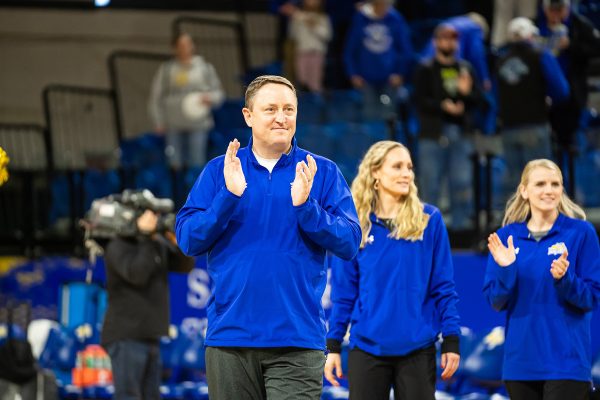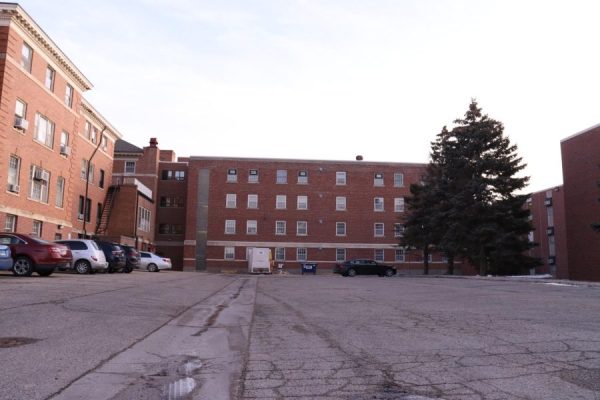Legislators look to ban texting while driving
February 2, 2010
Vanessa Marcano
The 2010 85th session of the South Dakota Legislative assembly began on Jan. 12, sparking discussions over several issues that will affect South Dakotans and SDSU in various ways.
House Bills 1025, 1026 and 1027 deal with future constructions occurring at SDSU. HB 1025 would authorize the Board of Regents to construct a motor pool building on campus, while HB 1026 would give the green light for phase II of the Electrical Engineering and Computer Science building. Both bills have been referred to the House Appropriations committee for further discussion and any possible amendments.
HB 1027, which allows for the construction of a visitor center in McCrory Gardens, was heard and amended twice on Jan. 28. On Feb. 2, HB 1027 was deferred to another day.
On Jan. 28, the House read HB 1156, which would provide health insurance coverage for contraceptive drugs and devices. HB 1156 states that “no policy of group health insurance ? may exclude or restrict” benefits for contraceptive devices or drugs approved by the Federal Drug Administration. HB 1156 would also ban health insurance providers from denying eligibility based on current or potential use of contraceptives or penalize or limit reimbursement of a health care professional for prescribing contraceptives, among other provisions in the bill. HB 1156 is currently at the House Commerce Committee.
On Jan. 27, HB 1144 was read and referred to the House Affairs Committee. HB 1144 seeks to revise the Human Relations Act to include additional categories of persons, to include protection against discrimination based on age, veteran status, sexual orientation or gender identity.
Sponsored by Rep. Deb Peters, HB 1144 “adds age, sexual orientation, gender identity and veteran or military status to the classes of persons protected from discrimination under S.D.’s human rights laws,” according to the Madville Times alternative community news blog.
HB 1178, which would ban the use of certain wireless communications devices while driving, was read and referred to the House State Affairs Committee on Jan. 28. The bill defines wireless communications device as a “hand-held cellular phone or a portable electronic device that is capable of receiving and transmitting data, including text messages and e-mail”, but excludes devices that are affixed on the car, such as a GPS, if it is only used for navigation. HB 1178 would make it a “careless driving” class 2 misdemeanor to drive on a highway while “using a wireless communications device to compose, read or send an electronic message.”
According to state law, a class 2 misdemeanor punishment could result in 30 days imprisonment in a county jail, a $500 fine, or both.
On Feb. 3, HB 1189, which seeks to prohibit discrimination based on domestic violence in life and health insurance policies, was scheduled for hearing. HB 1189 would prohibit health insurers to ask questions relating to domestic violence for the purpose of offering, renewing or limiting coverage.
Meanwhile, Senate Bill 18, sponsored by Senator Corey Brown, would restrict teachers and other state employees from retiring and being rehired at the same position without certain provisions that would satisfy the IRS, according to the South Dakota Newspaper Association’s Community News Service.
Brown explained that the bill would protect the state retirement plan by defining a minimum three-month period before qualifying for benefits, while at the same time making the return to work provision “cost neutral”. Brown told the Senate that the practice has cost the system $5.3 million last year. SB 18 now moves to the House, first for consideration in committee.
Currently heading to the House after its approval on Jan. 27 by the House Commerce Committee is HB 1002, which would allow alcohol sales 365 days a year (as opposed to being prohibited on Sundays in some communities), consolidate alcohol sales schedule from 2 a.m. to 7 a.m. and establish that there must be a person 21 years of age or older working in the premises of alcohol sales at all times. The SDNA Community News Service reported that towns objecting to liquor sales on Sundays would have to opt out.
HB 1103, sponsored by Rep. Rausch, would authorize the use of golf carts in certain municipalities and improvement districts. Currently at the Senate, HB 1103 would require the golf carts to be insured, the driver to possess a valid driver’s license and the vehicle to display a slow-moving vehicle emblem.
























